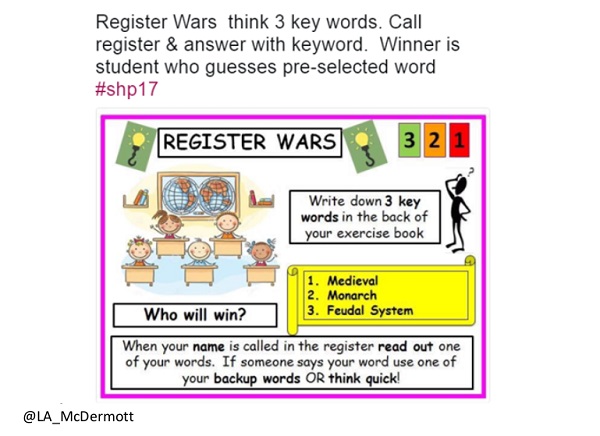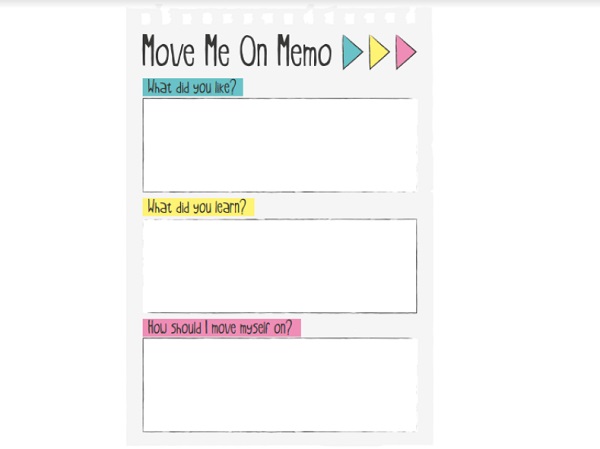It’s an old fashioned approach - the teachers who made a positive impact upon you have been doing it for years. Learning productively with students is all about relationships, how you make them feel, as Maya Angelou knew. Professor John Hattie picks out student expectations as the variable that has the greatest effect size for maximizing impact on learning. If students know that you know them, they will expect you to keep close tabs, understand “These links help to build relationships and are great for parents evenings.”how to get the best from them, and so hopefully they proactively move forward with you! The trick is to make this ‘path of least resistance’ the norm. In the daily melee of multiple plate-spinning it can be easy to forget the personalities and people behind the students who present themselves in your classroom. Here are some quick winning September ways to ensure this is not the case:
Listed is a pick and mix (yes I had a Saturday job in Woolworths!) selection of planned overt approaches to make sure you “get to know your new recruits” whilst still keeping to the business of the subject under study.
1. Meet and greet. I know this is often easier said than done, but aim to prioritise it and make it a September habit to get your lessons off to the ‘straddling the threshold’ position!
2. Once welcomed, use an early lesson for a Nothing New… A Review of You session! Invest time in any subject to ask students to outline something of their story so far; achievements, hobbies, pets, part-time jobs, ambitions, hopes and dreams. Frame it however you like, but make it meaningful and relevant to the age and stage of the students. For more subtle detective work, harness the lesson content to student experience. For example, in Geography use some local landmarks to elicit responses that have meaning from students so you can build up a picture of their points of reference. In Maths, develop self-efficacy by encouraging students to frame customised problems linked to suit student preferences and interest. In Food Tech, what kitchen disasters or successes have they encountered? The list is endless, so be creative and link the learning to your students and find out what makes them tick!
3. A dynamic approach is vital! Once you have read the information and made a note of it in your mark book by building up a pupil profile, you will know of significant events in each student’s life - something you can henceforth ‘hook on to’ as appropriate. These “Students get to know each other and more about the richness of the subject.”links help to build relationships and are great for parents evenings, since inevitably the parents or carers will share the association with you, while also being reassured that you know the student in question. A powerful use of the information to maximise impact is to immediately acknowledge your findings (judicious use of the information mindful of confidentiality and potential embarrassment) in a general feedback session at start of next lesson. For example: “Someone here has a part-time job in Sainsbury’s... someone here has seven goldfish.... someone here has grade 1 piano... someone here supports Leeds Rhinos... someone here is a World Champion Cumberland and Westmoreland Wrestler [that is one I genuinely encountered]”… or whatever it may be! This approach early in the course helps overcome Theodore Roosevelt’s contention: “Nobody cares how much you know, until they know how much you care.”
4. Set students a homework task based on one of your first lessons. The task has to be completed with a home partner or study buddy. This is a great way to forge links, thus winning over family members, raising the profile of your work and expectations and setting the standard soon in the course. A task that works well is an Entry Pass summary of something learned about in class, that students then have to “teach” - or at least discuss with or explain to a family member. Higher-order thinking skills can be encouraged at whatever stage is deemed appropriate and the activity replicated as the course progresses.
5. A Cocktail Party is a great ‘big picture’ starter in any subject. Ask students to research (obviously provide shared parameters: a writing frame, data capture sheet, ”gimme 5” or whatever suits) their ideal famous party guest - scientist, musician, film, country, book, character from history, sportsperson and so on. They then of course have to justify their choices. As well as you gaining an insight into the student’s preferences, there is scope too for students to liaise with classmates. Students could thereafter mill around, sharing their findings and judgments by talking to their new classmates, thus getting to know each other and more about the richness of the subject in question. The final pieces could neatly be made into a wall display for the classroom, which can then be referred to and worked on as the course progresses.
6. Revealing Registration is an ongoing, more subtle approach where students answer the register with a response to a key question announced at the start: “What’s your favourite animal?”, “What’s your favourite pizza topping?” In the main, time constraints mean you’ll need to deal with this swiftly, perhaps pausing only upon one or two unusual ones, or use what you know already to make students feel even better by use of affirmations - “That’s a great choice, one of my favourites too”. This is a strategy that gets students thinking, listening, wondering and making judgements. It keeps them on their toes and allows you to learn more about them. In time, pass the questions over to them - but vet first!
This can develop into ‘register wars’ (an idea created by @LA_McDermott, see below) whereby the students note down three topics or previous topic-related keywords (more might be needed). Each student responds to their register name with a keyword and can’t repeat (be mindful to jumble the register). The winner is the one who matches with the teacher’s pre-selected word.

7. Top and Tail - Obviously it is good practise periodically (don’t simply leave it to the end, the boat has then been missed!) to ask students to reflect on the approaches, methods and techniques that you have used to allow them to progress. Something that also works well is a ‘Move Me On Memo’. Rather like an advice and guidance slip, this routine of taking time to take stock and reflect is a good metacognitive approach that can lead to greater efficiency going forward. Interestingly, on completion of an AS course, one student wrote: “I enjoyed it when you asked me about myself at the start of Year 12, no-one has ever done that before. It made me think you cared and so I cared about what I was working on with you too.”

Give them a try let me know how you go. Be ambitious for yourself and your students and have a very Happy New School Year!
How do you develop teaching and learning from Day 1? Let us know below.


















